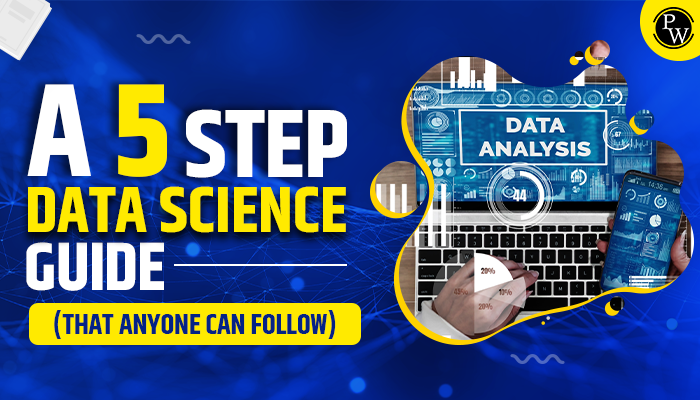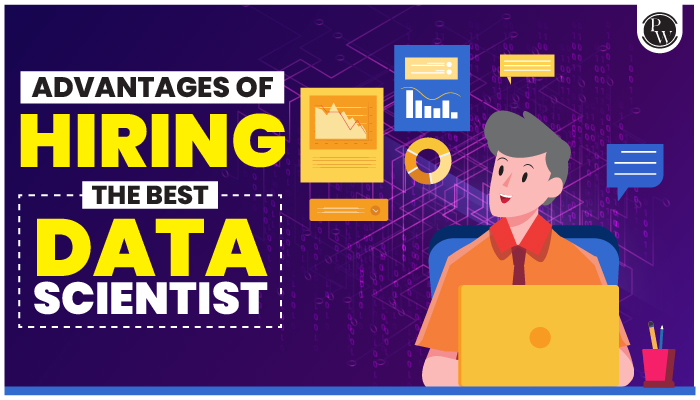Data science careers extend beyond technical skills, involving collaboration with engineers, developers, coders, and analysts.
Data Science Career: Navigating the dynamic world of data science careers can be just as thrilling as unraveling the mysteries hidden within rows and columns of data.
“The most important thing in a data science career is to have a good mentor,” a sage piece of advice from a prominent figure in the field, speaks volumes about the journey that lies ahead.

It’s a piece of advice that rings true whether you’re just dipping your toes into the vast ocean of data science or you’re ready to dive into its depths.
Whether you’re deciphering code or calculating probabilities, your path begins here, with the first step into a world where data is the currency of choice.
For those inspired to join the ranks of innovative thinkers and problem-solvers, the Data Science with Generative AI Course by Physics Wallah stands out as your launchpad.
What is Data Science?
Data Science is the interdisciplinary study of data aimed at extracting valuable insights for business applications. The term “data scientist” emerged as the need for professionals skilled in organizing and analyzing massive amounts of data became evident.
Data Science Career in India
Embarking on a career in data science opens up a myriad of opportunities, each playing a crucial role in influencing key business decisions. These roles often collaborate within the same team to collectively contribute to the organization’s data-driven objectives. Here are some prominent roles in the field of data science:
1) Data Scientist:
- Responsibilities: Building models using programming languages like Python, transforming models into applications, collaborating with cross-functional teams to solve complex problems, analyzing data, and making predictions.
- Skills: Statistics, mathematics, machine learning, programming, data analysis, and proficiency in tools like Hadoop, SQL, etc.
- Education: Bachelor’s degree or equivalent, with master’s or doctoral degrees being common in the field.
2) Data Analyst:
- Responsibilities: Using structured data to solve business problems, acquiring, cleaning, and reorganizing data for analysis, utilizing tools like SQL, Python, and R for statistical analysis and data visualization.
- Skills: Programming languages (SQL, Python, R, SAS), statistics, math, and data visualization.
- Education: Bachelor’s degree in mathematics, computer science, finance, statistics, or related fields.
3) Data Architect:
- Responsibilities: Creating blueprints for data management systems, designing plans to integrate and maintain various data sources, overseeing underlying processes and infrastructure.
- Skills: Coding languages (Python, Java), data mining, management, machine learning, SQL, and data modeling.
- Education: Bachelor’s degree in data, computer science, or related fields.
4) Data Engineer:
- Responsibilities: Preparing and managing large amounts of data, developing and optimizing data pipelines and infrastructure, making data accessible for data scientists and business analysts.
- Skills: Programming languages (Java), understanding of NoSQL databases (MongoDB), frameworks like Apache Hadoop.
- Education: Bachelor’s degree in math, science, or business-related fields.
5) Machine Learning Engineer:
- Responsibilities: Researching, building, and designing artificial intelligence for machine learning, serving as a liaison between data scientists and architects.
- Skills: Knowledge of tools like Spark, Hadoop, R, Apache Kafka, Tensorflow, quantitative analysis, data structures, and modeling.
- Education: Often requires a master’s or Ph.D. in computer science or related fields.
6) Business Analyst:
- Responsibilities: Utilizing data to form business insights, making recommendations for organizational improvements, identifying issues, and enhancing efficiency.
- Skills: SQL, Excel, data visualization, financial modeling, data and financial analysis, business acumen.
- Education: Bachelor’s degree in economics, finance, computer science, statistics, business, or related fields.
In the dynamic landscape of data science, these roles present exciting prospects for individuals with diverse skill sets and interests. As the demand for data-driven decision-making continues to grow, a career in data science becomes not only lucrative but also intellectually stimulating.
Also Read: Top 30 Deep Learning Interview Questions for Data Scientists
Career in Data Science for Freshers
A career in data science for freshers presents exciting opportunities in various job roles. Here are some entry-level positions that freshers can explore in the field of data science:
1) Data Analyst:
- Responsibilities:
- Analyzing and interpreting complex datasets.
- Preparing reports and visualizations.
- Identifying trends and patterns in data.
2) Junior Data Scientist:
- Responsibilities:
- Assisting in developing machine learning models.
- Data cleaning and preprocessing.
- Collaborating with senior data scientists on projects.
3) Data Engineer:
- Responsibilities:
- Building and maintaining data architecture.
- Developing ETL (Extract, Transform, Load) processes.
- Ensuring data accessibility and availability.
4) Business Analyst:
- Responsibilities:
- Using data to provide insights for business decisions.
- Conducting market research and analysis.
- Collaborating with teams to enhance processes.
5) Research Analyst:
- Responsibilities:
- Conducting research on industry trends.
- Gathering and analyzing data for research projects.
- Presenting findings through reports and presentations.
6) Data Science Intern:
- Responsibilities:
- Assisting in various data science projects.
- Learning and applying data science techniques.
- Collaborating with teams to solve data-related challenges.
7) Machine Learning Engineer (Trainee):
- Responsibilities:
- Assisting in building and optimizing machine learning models.
- Collaborating with data scientists on algorithm development.
- Learning and applying machine learning concepts.
8) Database Administrator (Trainee):
- Responsibilities:
- Assisting in database management and optimization.
- Learning database design and implementation.
- Ensuring data security and integrity.
9) Data Visualization Analyst:
- Responsibilities:
- Creating visualizations to communicate data insights.
- Using tools like Tableau or Power BI.
- Collaborating with teams to enhance data storytelling.
10) Research Assistant (Data Science):
- Responsibilities:
- Assisting in academic or industry research projects.
- Collecting, cleaning, and analyzing research data.
- Supporting senior researchers in data-related tasks.
11) Data Entry Analyst:
- Responsibilities:
- Entering and updating data in databases.
- Verifying and cleaning datasets.
- Ensuring data accuracy and completeness.
12) Data Support Specialist:
- Responsibilities:
- Providing support for data-related inquiries.
- Assisting in data quality assurance.
- Collaborating with teams to resolve data issues.
These roles offer a solid foundation for freshers to gain practical experience, learn ind
ustry tools, and eventually progress into more specialized positions within the data science field. It’s important for freshers to focus on building a strong skill set, gaining hands-on experience, and continuously learning to advance their careers in data science.
Also Check: Top 30+ Angular Interview Questions and Answers for 2024
Data Scientist Skills & Qualifications
Data science has emerged as a pivotal field, driving innovation and decision-making across various industries. A successful data scientist possesses a multifaceted skill set, combining technical proficiency with essential interpersonal skills. Here’s an in-depth exploration of the key technical and interpersonal skills that define a proficient data scientist:
Technical Skills:
1) Deep Knowledge and Familiarity with Statistical Analysis:
- Data scientists must have a solid foundation in statistical methods, encompassing concepts like probability distributions, hypothesis testing, and regression analysis.
- Applying statistical techniques to draw meaningful inferences from data.
2) Machine Learning and Deep Learning:
- Expertise in machine learning algorithms and frameworks is crucial for building predictive models.
- Understanding concepts related to deep learning, neural networks, and their applications.
3) Data Visualization:
- Proficiency in data visualization tools such as Tableau, Power BI, or Matplotlib.
- Transforming complex data insights into visually compelling presentations for diverse audiences.
4) Mathematics:
- A strong mathematical background, including knowledge of linear algebra and calculus.
- Applying mathematical concepts to formulate and solve problems in the context of data science.
5) Programming:
- Mastery of programming languages, particularly Python and R, for data manipulation and analysis.
- Writing efficient and scalable code to process and analyze large datasets.
6) Managing Unstructured Data:
- Skills in handling unstructured data, including text mining and natural language processing.
- Extracting valuable insights from diverse data formats.
7) Knowledge of Data Analysis Tools:
- Familiarity with tools like SAS, Hadoop, Spark, and others for effective data processing and analysis.
- Implementing data extraction, transformation, and loading (ETL) processes.
8) Big Data Processes, Systems, and Networks:
- Understanding big data technologies and architectures, such as distributed computing frameworks.
- Efficiently managing and processing large datasets in a distributed environment.
9) Software Engineering:
- Applying software engineering principles to ensure the development of robust and scalable data science solutions.
- Utilizing version control systems, collaborative coding practices, and agile methodologies.
10) Statistics:
- In-depth knowledge of statistical concepts and methodologies, including advanced statistical techniques.
- Applying statistical reasoning to derive meaningful insights from data.
Interpersonal Skills:
1) Communication Skills:
- Effectively conveying complex findings to both technical and non-technical stakeholders.
- Collaborating with cross-functional teams through articulate and clear communication.
2) Storytelling:
- Crafting compelling narratives to communicate data-driven insights in a coherent manner.
- Making data accessible and engaging through the art of storytelling.
3) Critical Thinking and Logic:
- Applying analytical reasoning and logical problem-solving to tackle complex challenges.
- Evaluating alternative solutions and making data-driven decisions.
4) Business Acumen:
- Understanding organizational goals and aligning data science efforts with broader business objectives.
- Translating data insights into actionable strategies that contribute to business success.
5) Curiosity:
- A natural inclination towards exploration and discovery within datasets.
- Maintaining a curious mindset to uncover patterns and trends in data.
6) Adaptability and Flexibility:
- Adapting to evolving technologies, methodologies, and project requirements.
- Navigating through diverse datasets and adjusting strategies accordingly.
7) Problem Solving:
- Identifying and addressing intricate challenges encountered in the process of data analysis.
- Developing innovative solutions to solve real-world business problems.
8) Teamwork:
- Collaborating seamlessly with team members from diverse backgrounds and disciplines.
- Contributing to a positive team culture through effective teamwork.
A proficient data scientist seamlessly integrates technical prowess with effective interpersonal skills. The ability to bridge the gap between raw data and actionable insights, coupled with excellent communication and problem-solving skills, distinguishes an exceptional data scientist in the competitive landscape of data science.
Also Read: How to Learn Data Science on a Mobile Device
Data Science Career Salary
The salary in the field of data science can vary based on factors like experience, skills, location, and the employer. Here is a general overview of data science career salaries:
1) Data Scientist:
- Entry Level: ₹500,000 – ₹900,000 per annum
- Mid-Level: ₹900,000 – ₹1,500,000 per annum
- Experienced: ₹1,500,000 and above per annum
2) Data Analyst:
- Entry Level: ₹400,000 – ₹700,000 per annum
- Mid-Level: ₹700,000 – ₹1,200,000 per annum
- Experienced: ₹1,200,000 and above per annum
3) Data Engineer:
- Entry Level: ₹500,000 – ₹800,000 per annum
- Mid-Level: ₹800,000 – ₹1,300,000 per annum
- Experienced: ₹1,300,000 and above per annum
4) Machine Learning Engineer:
- Entry Level: ₹600,000 – ₹1,000,000 per annum
- Mid-Level: ₹1,000,000 – ₹1,800,000 per annum
- Experienced: ₹1,800,000 and above per annum
Recommended Technical Course
- Full Stack Development Course
- Generative AI Course
- DSA C++ Course
- Java+DSA 1.0 Course
- Data Analytics Course
- Data Science with ML 1.0 Course
- Free Backend Development Course
Data Science Career Path (Step by Step Guide)
Data science is a dynamic and multidisciplinary field that combines expertise in statistics, programming, and domain-specific knowledge to derive meaningful insights from data. If you aspire to embark on a rewarding career in data science, here’s a step-by-step guide to help you navigate the data science career path:
Step 1: Develop a Strong Educational Foundation
1) Educational Background:
- Begin by obtaining a strong educational background in relevant fields such as computer science, statistics, mathematics, or engineering.
- A bachelor’s degree is the minimum requirement, but many data scientists pursue master’s or Ph.D. degrees for advanced roles.
Step 2: Acquire Core Technical Skills
1) Technical Proficiency:
- Build a solid foundation in programming languages such as Python and R, which are widely used in data science.
- Gain proficiency in data manipulation, analysis, and visualization libraries and tools (e.g., Pandas, NumPy, Matplotlib).
2) Statistical Knowledge:
- Develop a deep understanding of statistical concepts and methodologies.
- Master statistical techniques for hypothesis testing, regression analysis, and probability distributions.
3) Machine Learning and Deep Learning:
- Acquire knowledge of machine learning algorithms and frameworks.
- Explore deep learning techniques for complex pattern recognition tasks.
4) Data Wrangling and Exploration:
- Learn data cleaning, preprocessing, and wrangling techniques.
- Practice exploratory data analysis to uncover patterns and trends.
Step 3: Gain Specialized Skills
1) Data Engineering:
- Acquire skills in data engineering to handle large-scale data processing and infrastructure.
- Learn about data pipelines, ETL (extract, transform, load) processes, and distributed computing frameworks.
2) Big Data Technologies:
- Familiarize yourself with big data technologies such as Hadoop and Spark.
- Understand distributed computing concepts for efficient handling of big datasets.
Step 4: Advanced Learning and Specializations
1) Advanced Degrees and Certifications:
- Consider pursuing advanced degrees (master’s or Ph.D.) for specialized roles or higher-level positions.
- Obtain certifications in specific data science tools and technologies to enhance your credentials.
2) Specialized Areas:
- Explore specialized areas within data science, such as natural language processing, computer vision, or reinforcement learning.
- Attend workshops, webinars, and conferences to stay updated on emerging trends.
Step 5: Gain Practical Experience
1) Real-world Projects:
- Work on real-world data science projects to apply theoretical knowledge.
- Showcase your projects through platforms like GitHub to demonstrate your practical skills.
2) Internships and Industry Exposure:
- Pursue internships or entry-level positions in data-related roles to gain industry exposure.
- Collaborate with professionals and learn from real-world scenarios.
Step 6: Build a Professional Network
1) Networking:
- Attend industry conferences, meetups, and networking events to connect with professionals.
- Engage with the data science community through online forums, social media, and professional groups.
Step 7: Develop Soft Skills
1) Communication and Collaboration:
- Hone your communication skills to effectively convey complex findings to diverse audiences.
- Develop collaboration skills to work seamlessly in cross-functional teams.
Step 8: Stay Updated and Continuous Learning
1) Continuous Learning:
- Embrace a mindset of continuous learning to stay abreast of evolving technologies and methodologies.
- Participate in online courses, webinars, and read research papers to expand your knowledge.
Step 9: Job Search and Career Progression
1) Job Search:
- Begin your job search for entry-level data science roles.
- Leverage professional networks, job boards, and company websites to explore opportunities.
2) Career Progression:
- Once employed, seek opportunities for career progression and specialization.
- Consider mentorship programs and engage in ongoing professional development.
Step 10: Pursue Advanced Roles and Leadership Positions
1) Advanced Roles and Leadership:
- As you gain experience, consider pursuing advanced roles such as machine learning engineer, data architect, or data science manager.
- Explore leadership positions where you can guide and lead data science teams.
By following these steps, you can navigate the data science career path systematically. Remember that the field is dynamic, and adaptability, curiosity, and continuous learning are essential for long-term success in data science.
What can I do for a Career in Data Science?
Embarking on a career in data science involves a strategic approach to gaining education, skills, and practical experience. Here’s a detailed guide on what you can do to build a successful career in data science:
1) Acquire Education and Skills:
- Complete Relevant Courses or Certificates:
- Enroll in reputable data science courses or certifications to gain foundational knowledge.
- Develop Technical Skills:
- Master programming languages like Python, R, and learn data manipulation libraries and statistical techniques.
2) Gain Practical Experience:
- Seek Entry-Level Positions or Internships:
- Apply for entry-level data science positions or internships to gain hands-on experience.
- Build a Portfolio:
- Create a portfolio showcasing your projects and practical skills to demonstrate your capabilities to potential employers.
3) Apply for Entry-Level Jobs:
- Target Entry-Level Positions:
- Apply to jobs specifically designed for individuals entering the data science field.
- Persistence in Job Search:
- Be persistent in your job search, as landing the first role might take time. Apply to numerous positions to increase your chances.
4) Prepare for Interviews:
- Practice Technical and Non-Technical Communication:
- Practice explaining your data science projects to a non-technical audience to enhance your communication skills.
- Understand Tools and Processes:
- Familiarize yourself with the tools and processes relevant to the job you’re interviewing for.
5) Embrace Continuous Learning:
- Stay Updated with Industry Trends:
- Keep abreast of industry trends, emerging technologies, and advancements in data science.
- Participate in Further Education:
- Consider pursuing advanced courses or certifications to deepen your knowledge and skills.
6) Networking:
- Connect with Professionals:
- Attend industry events, webinars, and networking sessions to build connections with professionals in the field.
- Utilize Online Platforms:
- Leverage online platforms like LinkedIn and GitHub to showcase your work and connect with professionals.
7) Plan for Career Progression:
- Set Career Goals:
- Define your career goals and plan for progression within the data science field.
- Explore Specializations:
- Consider specializing in areas such as machine learning, data engineering, or data analysis based on your interests.
8) Further Education and Certifications:
- Consider Advanced Degrees:
- Evaluate the option of pursuing master’s or Ph.D. degrees to enhance your credentials.
- Specialized Certifications:
- Obtain specialized certifications in areas relevant to your chosen career path.
9) Leadership Roles:
- Explore Leadership Opportunities:
- As you gain experience, consider opportunities for leadership roles within data science teams.
- Mentorship and Guidance:
- Seek mentorship from experienced professionals to guide your career progression.
A career in data science is a journey that involves a blend of education, hands-on experience, networking, and continuous learning. With perseverance and a strategic approach, you can build a successful and fulfilling career in this dynamic field.
Is Data Science a Good Career?
Data science stands as a beacon of opportunity in our increasingly digital world, offering a career path fraught with innovation, impact, and intellectual satisfaction. For those captivated by the power of data and seeking to engage with the future’s language, the answer is resounding: Data Science is not just a good career; it’s a remarkable one.
If you’re ready to embark on this journey, consider equipping yourself with robust knowledge and hands-on skills through ‘Decode Data Science with ML 1.0′ by Physics Wallah. Dive into the rich waters of data science and emerge as a skilled navigator in a sea of data. Your future in data science awaits – seize it, shape it, and let it propel you to new professional heights.
For Latest Tech Related Information, Join Our Official Free Telegram Group : PW Skills Telegram Group
Data Science Career FAQs
Is Data Science an IT Job?
Yes, data science is closely aligned with Information Technology (IT). It involves using technology and computational tools to analyze and interpret data for informed decision-making.
Is Data Science Job Difficult?
Data science jobs can be challenging due to the complexity of tasks involved, such as statistical analysis, programming, and machine learning. However, with the right education and skills, individuals can navigate the challenges successfully.
What Skills are Essential for a Data Scientist?
Essential skills for a data scientist include proficiency in programming languages (Python, R), statistical analysis, machine learning, data visualization, mathematics, and knowledge of data analysis tools (SQL, Hadoop, etc.).
How to Start a Career in Data Science as a Fresher?
Start by acquiring relevant education and skills through courses or certifications. Gain practical experience through internships or entry-level positions. Build a portfolio showcasing your projects and apply for suitable positions.
What are Entry-Level Roles in Data Science?
Entry-level roles include positions such as Data Analyst, Junior Data Scientist, or Research Assistant. These roles focus on foundational tasks and offer opportunities to learn and grow in the field.




